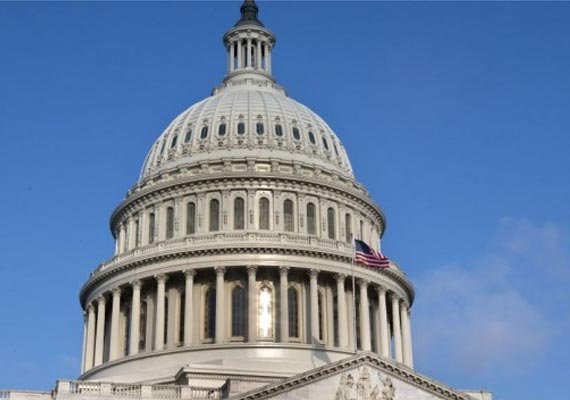
Washington: The US Congress has sought to enhance its monitoring of Pakistan, in particular its counter-terror actions, by asking the Obama administration for a six-monthly report on US-Pak bilateral security cooperation.
In the latest annual National Defence Authorisation Act (NDAA) 2015, the US House of Representative and the Senate, following a conference this week, agreed to add another layer of restrictions and conditions on Pakistan for release of coalition support fund amounting to USD 1 billion for the fiscal year 2015.
As per the Act, for release of USD 300 million of the USD 1 billion, the US Defence Secretary needs to give a certification to Congress that Pakistan has taken actions against the Haqqani network and continues to clean up the safe havens in North Waziristan.
This new certification requirement on release of USD 300 million is in addition to the already existing certification and waiver requirement, prominent among these include that Pakistan is taking action against terrorist networks including Lashkar-e-Taiba (LeT).
For the past few years, the US Defence Secretary has been providing necessary certification and waiver in national interest, Congressional sources told PTI.
The final text of the NDAA 2015 was passed by the House of Representatives on Thursday. It now goes to the Senate for formal approval.
Coalition Support Fund or CSF is not military aid, but a reimbursement to Pakistan for the expenses borne by its army in support of the US military operations in Afghanistan.
However, the US Congress has imposed several restrictions on reimbursement of the Coalition Support Fund to Pakistan.
The NDAA 2015 asks the Defence Secretary to submit a report to Congress on US-Pakistan bilateral security cooperation, within the first 90 days of the passage of this bill and every six months thereafter till December 2017.
The final version of the NDAA 2015 has removed reference to Pakistani physician Dr Shakil Afridi, who aided in the capture of slain al-Qaeda leader Osama bin Laden.
The House version of the bill had called on Pakistan to release him immediately from prison.
"We note the contributions of Dr Afridi to efforts to locate Osama bin Laden. We are concerned about Dr Afridi's continuing incarceration and urge the government of Pakistan to release him immediately," said a joint explanation summary released by the House and the Senate.
According to the final version of the bill, USD 300 million would not be released to Pakistan unless the Defence Secretary certifies to the Congressional Defence Committees that "Pakistan has undertaken military operations in North Waziristan that have contributed to significantly disrupting the safe havens and freedom of movement of the Haqqani network in Pakistan".
For the release of USD 300 million, the Defence Secretary also needs to certify that Pakistan has taken steps that have demonstrated a commitment to ensuring that North Waziristan does not return to being a safe haven for the Haqqani network.
The report on US-Pakistan bilateral security cooperation needs to have a description of any strategic security objectives that the US and Pakistan have agreed to pursue in cooperation and a description of programmes or activities that the two countries have jointly undertaken to pursue mutually agreed security cooperation objectives.
In the report, the Congress also seeks a description and assessment of the effectiveness of efforts by Pakistan, unilaterally or jointly with the US, to disrupt operations and eliminate safe havens of al-Qaeda, Tehreek-e-Taliban Pakistan, and other militant extremist groups such as the Haqqani Network and the Quetta Shura Taliban located in Pakistan.
It also seeks assessment of efforts by Pakistan, unilaterally or jointly with the US, to counter the threat of improvised explosive devices and the networks involved in the acquisition, production, and delivery of such devices and their precursors and components.





















